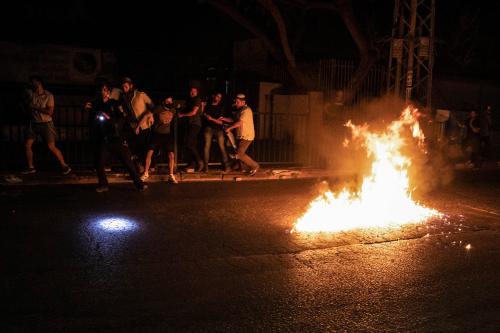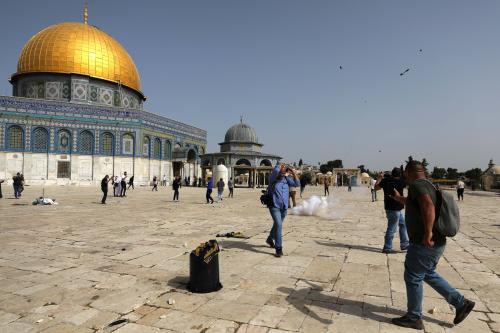As I noted last week, it’s well past time to dispel any illusions that the Israeli-Palestinian conflict was simmering quietly on a back burner, or mitigated by new Israeli-Gulf diplomatic openings. But after two weeks of horrific violence, including intercommunal violence between Jewish and Palestinian citizens inside Israeli cities and hundreds of deaths in an already-miserable and COVID-19-ridden Gaza, what now?
The roots of this crisis lie in the diplomatic vacuum created by the long, slow death of the Oslo peace framework. This vacuum was exploited by politicians inside and outside the region for short term gains, and gave extremists every incentive to indulge their worst impulses. This crisis is just an alarming taste of what the Israeli-Palestinian conflict can look like when the parties (aided by the Trump administration in recent years) walk away from negotiated compromise. This vacuum was obvious and worrying long before May 2021, and that’s precisely why I argued, in a December Center for a New American Security (CNAS) report with Ilan Goldberg and Michael Koplow, for the incoming Biden-Harris administration to move out with alacrity on a new diplomatic approach.
The violence and suffering of the past two weeks make that work harder, but all the more necessary. Today’s shaky ceasefire between Israel and Hamas is a good thing in itself, but without further diplomacy it will prove just a brief respite from the violence. Now is the time for the U.S. government to put in place other steps, to try to prevent further violence and to lay the necessary foundations for Israel and the Palestine Liberation Organization (PLO), the two parties who recognized one another in 1993 as representatives of their respective peoples, to recommit to negotiated compromise and get back to dialogue.
Here are some initial steps Washington can take to move this conflict back from the abyss and lay the foundations for dialogue:
Rebuild effective diplomatic channels.
It’s undeniable that authoritative diplomats will be essential to the work ahead. The Biden-Harris administration’s chief Israeli-Palestinian policy official, our former Brookings colleague Hady Amr, has been in the region since the crisis began. If the administration moves forward, as reported, with sending veteran diplomat Michael Ratney to Jerusalem as chargé d’affaires, that will prove a good step forward as well. But the United States urgently needs to reestablish a standing diplomatic channel to the Palestinians that does not run through the U.S. Embassy in Israel. That channel need not have a physical platform in a new consulate — yet —but it needs to be established right away. Reopening the PLO office in Washington should also be a goal, but it will take some work by the Palestinians to meet requirements under U.S. law.
Simultaneously, the White House needs to recognize that, while it would prefer the senior-level U.S.-Israeli conversation to focus on Iran and security cooperation, the president, national security adviser, and other national security principals will also have to devote time and attention to this issue if they want to avoid a continued slide that derails other priority regional goals. That means grappling with, rather than sidestepping, the tradeoffs forced by the ways this conflict shapes regional governments’ behavior. Already the crisis won rare presidential praise for Egypt’s brutally repressive dictator, Abdel-Fattah el-Sissi, and more such tradeoffs are likely to come. The national security policy debate on how to make them needs to start now.
And, yes, the administration urgently needs a Senate-confirmed ambassador to Israel — one who will engage across Israel’s society and political spectrum, and manifest America’s commitment to the vibrancy of the country’s democracy and diverse civil society.
Press both sides to address deep-seated political challenges and renew their political leadership.
On the Israeli side, the intercommunal violence shocked and horrified the country and endangered the delicate balance of Arab-Jewish coexistence. But this rift in the social fabric did not emerge in a vacuum. As a friend and partner, for whom shared democratic values is the very foundation of our partnership, the United States must not be silent on the imperative of equality and mutual respect between Palestinian and Jewish citizens of Israel. Israel’s democracy, like our own, is showing broader signs of strain, especially in freedom of association and in the media. Whatever the Biden-Harris administration’s intentions are on democratic solidarity globally, the U.S.-Israel relationship is one arena where democratic solidarity would yield benefits for both our values and our interests.
The Palestinian people are in desperate need of a legitimate elected leadership that can end the division between the West Bank and Gaza and put forward an authoritative voice in talks with Israel. Earlier this year, Hamas and the PLO’s ruling Fatah party had reached tentative agreement on Palestinian Authority (PA) elections as part of a reconciliation process that would produce a unified PA and end the bitter division between the West Bank and Gaza. But the elections were met with only tepid international support, and were ultimately scuttled by infighting within PA President Mahmoud Abbas’s Fatah movement. The U.S. government must press Abbas for political reforms that will liberate Palestinians’ rich civil society, clarify mechanisms for succession, enable a new generation of party leadership to rise, and facilitate a free and fair election. Israel must also facilitate these elections, including enabling East Jerusalem Palestinians to vote. Moving this agenda forward requires the U.S. to overcome its hangover from the 2006 Palestinian elections, in which Fatah split, Hamas won a majority in the parliament, then Hamas pulled out of a coalition government and took over Gaza by force. We address details, including on how to deal with Hamas’s role in this process, in our recent CNAS report.
If Palestinians can have an election within six to nine months, and if Israelis can finally achieve a stable coalition government after two years and four elections, that will establish more authoritative leadership that enables a new foundation for dialogue between the two sides.
Bring the region in to help.
The so-called Abraham Accords, diplomatic openings between Israel and Bahrain, the United Arab Emirates, Morocco, and Sudan, strengthened the pro-American coalition in the region and created opportunities for Arab states and Israel to pursue mutually-advantageous security, economic, and social projects. The heavy-handed Israeli actions in Jerusalem and then the Israel-Hamas war have now put Israel’s new Arab partners in an uncomfortable spot. This was the risk they took in opening ties with Israel.
The Biden-Harris administration has been under pressure to “follow up” on the Abraham Accords; they must now do so by enlisting Arab support for constructive Israeli-Palestinian engagement. This need not, indeed should not, take the form of a “peace summit” or other symbolic gathering. Nor do I believe that the Arab governments want to, or can effectively, take responsibility for Gaza reconstruction, as proposed by Michael Koplow.
Rather, the U.S. government should focus on practical projects that bring benefits to all involved. The UAE, for example, is interested in health-sector cooperation with Israel to fight COVID-19; Abu Dhabi should now launch a trilateral initiative that will bring UAE investment and capability and Israeli medical expertise together to help a Palestinian population — especially in Gaza — that’s right now at the mercy of an uncontrolled pandemic. It doesn’t hurt that Israel’s health sector is one of the most integrated (Jewish-Arab) in the country.
Other Arab states also have key roles to play. Washington must press Jerusalem to repair its frayed ties with Amman and bring Jordan back into the loop of Israeli-Palestinian discussions, especially in managing delicate arrangements at the Haram al-Sharif/Temple Mount. King Abdullah II has his own keen interest in being part of calming tensions between Israelis and Palestinians; and Jordanian stability is key to the stability of the region overall.
To proceed, President Joe Biden should move forward from his consistent, principled rhetoric that Israelis and Palestinians deserve equal measures of freedom, security and prosperity. He should clearly articulate his insistence on a negotiated solution to this conflict as the only acceptable path to achieve those equal measures, and stress that he will support steps that facilitate and advance negotiations and oppose steps that hinder them. Washington cannot make up for a lack of leadership and political will for negotiated compromise in Israel and Palestine, but it can engage both sides, and their neighbors, to help close the gap.
The underlying cause of the crisis now underway — and yes, even with a ceasefire Israelis and Palestinians are very much in a crisis — is the lack of any meaningful diplomatic pathway for the two sides to negotiate their dispute peacefully. The steps outlined above can engage both local and regional actors in managing the crisis to prevent further violence and get the two sides ready to talk once again.









Commentary
Congratulations on the ceasefire. Now the hard work begins.
May 21, 2021